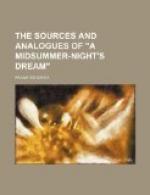HOW ROBIN GOOD-FELLOW TURNED A MISERABLE USURER TO A GOOD HOUSE-KEEPER
In this country of ours there was a rich man dwelled, who to get wealth together was so sparing that he could not find in his heart to give his belly food enough. In the winter he never would make so much fire as would roast a black-pudding, for he found it more profitable to sit by other men’s. His apparel was of the fashion that none did wear; for it was such as did hang at a broker’s stall, till it was as weather-beaten as an old sign. This man for his covetousness was so hated of all his neighbours, that there was not one that gave him a good word. Robin Good-fellow grieved to see a man of such wealth do so little good, and therefore practised to better him in this manner.
One night the usurer being in bed, Robin in the shape of a night-raven[7] came to the window, and there did beat with his wings, and croaked in such manner that this old usurer thought he should have presently died for fear. This was but a preparation to what he did intend; for presently after he appeared before him at his bed’s feet, in the shape of a ghost, with a torch in his hand. At the sight of this the old usurer would have risen out of his bed, and have leaped out of the window, but he was stayed by Robin Good-fellow, who spake to him thus—
If thou dost stir out of thy bed,
I do vow to strike thee dead.
I do come to do thee good;
Recall thy wits and starkled[8] blood.
The money which thou up dost store
In soul and body makes thee poor.
Do good with money while you may;
Thou hast not long on earth to stay.
Do good, I say, or day and night
I hourly thus will thee affright.
Think on my words, and so farewell,
For being bad I live in hell.
Having said thus he vanished away and left this usurer in great terror of mind; and for fear of being frighted again with this ghost, he turned very liberal, and lived amongst his neighbours as an honest man should do.
HOW ROBIN GOOD-FELLOW LOVED A WEAVER’S WIFE,
AND HOW THE WEAVER WOULD HAVE DROWNED HIM
One day Robin Good-fellow, walking through the street, found at the door sitting a pretty woman: this woman was wife to the weaver, and was a-winding of quills[9] for her husband. Robin liked her so well, that for her sake he became servant to her husband, and did daily work at the loom; but all the kindness that he showed was but lost, for his mistress would show him no favour, which made him many times to exclaim against the whole sex in satirical songs; and one day being at work he sung this, to the tune of Rejoice Bag-pipes—
Why should my love now wax
Unconstant, wavering, fickle,
unstaid?
With nought can she me tax:
I ne’er recanted what
I once said.
I now do see, as nature fades,
And all her works decay,
So women all, wives, widows, maids,
From bad to worse do stray.




